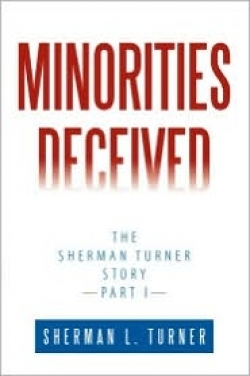
Minorities Deceived
The Sherman Turner Story, Part I
Sherman Turner’s Minorities Deceived is a memoir about the author’s experiences as a minority tradesman in the largely white field of plumbing. In a novelistic opening, Turner says he suffered a massive stroke at age fifty-four and, after fifteen years of rehabilitation therapy, only now is he able to tell his story.
Turner traces his experience with discrimination from the mid-fifties, when he was told in high school that certain jobs were “not a black man’s type of job.” His mother offered him advice that he took to heart: learn a trade. “When the factories won’t hire you because you’re a black man, then you can start your own business and have a job, regardless of what the white man says,” his mother said.
Turner took classes and pursued a trade, but it was only through the support of a white teacher that he was able to succeed. He had to overcome racial bias from fellow students, the Plumbers Union, and potential employers.
Turner finally passed the Master Plumber test (even though his test and license went mysteriously missing) and became the first black master plumber in Buffalo, New York. He started his own small business, which eventually led to Turner accepting work through Small Business Administration programs intended to benefit minorities.
Turner’s experiences with the SBA and the “white companies” with which he associated form the bulk of the book. Sadly, Turner recounts several stories which show “many of the white contractors were abusing the real intent of hiring blacks and minorities.” Rather than discriminate against others himself, however, Turner demonstrates through his own business practices and adherence to the letter of the law that he is a better businessperson than his biased colleagues.
As readers will learn from reading Minorities Deceived, discriminatory practices still exist today. They will also learn, however, that people like Sherman Turner manage to find ways to succeed despite such injustices. Turner not only grows a successful business; he speaks out on behalf of minorities. At the end of the book, Turner makes specific recommendations for “contracting requirements that should be in place” to help reduce the violation of government regulations.
Turner uses words sparingly and tells his story simply and directly. The author remains remarkably positive throughout the narrative; he has every right to be emotional and angry, yet he seems to have the ability to put things into perspective and react in a thoughtful, pragmatic way. Sherman Turner’s Minorities Deceived is a powerful tale well worth reading.
Reviewed by
Barry Silverstein
Disclosure: This article is not an endorsement, but a review. The publisher of this book provided free copies of the book and paid a small fee to have their book reviewed by a professional reviewer. Foreword Reviews and Clarion Reviews make no guarantee that the publisher will receive a positive review. Foreword Magazine, Inc. is disclosing this in accordance with the Federal Trade Commission’s 16 CFR, Part 255.
